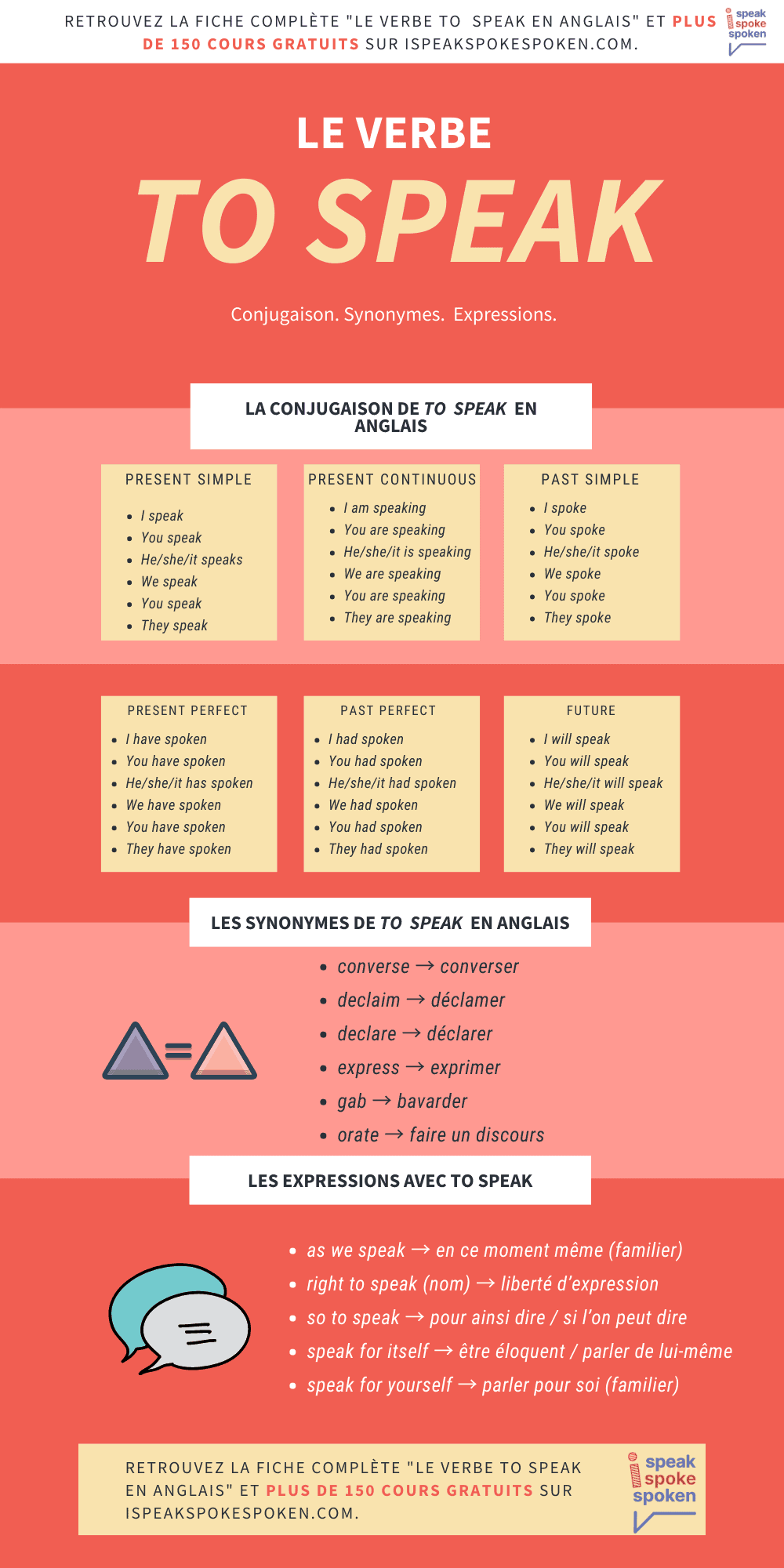De la conjugaison de speak en anglais à ses définitions, synonymes, expressions et phrasal verbs, découvrez tout ce qu’il faut savoir sur ce mot !
Tableaux de conjugaison de speak en anglais
Conjugaison du verbe speak à l’indicatif
Le verbe speak au present simple
- I speak
- You speak
- He/she/it speaks
- We speak
- You speak
- They speak
Le verbe speak au present continuous
- I am speaking
- You are speaking
- He/she/it is speaking
- We are speaking
- You are speaking
- They are speaking
Le verbe speak au past simple
- I spoke
- You spoke
- He/she/it spoke
- We spoke
- You spoke
- They spoke
Le verbe speak au past continuous
- I was speaking
- You were speaking
- He/she/it was speaking
- We were speaking
- You were speaking
- They were speaking
Le verbe speak au present perfect
- I have spoken
- You have spoken
- He/she/it has spoken
- We have spoken
- You have spoken
- They have spoken
Le verbe speak au present perfect continuous
- I have been speaking
- You have been speaking
- He/she/it has been speaking
- We have been speaking
- You have been speaking
- They have been speaking
Le verbe speak au past perfect
- I had spoken
- You had spoken
- He/she/it had spoken
- We had spoken
- You had spoken
- They had spoken
Le verbe speak au past perfect continuous
- I had been speaking
- You had been speaking
- He/she/it had been speaking
- We had been speaking
- You had been speaking
- They had been speaking
Le verbe speak au future
- I will speak
- You will speak
- He/she/it will speak
- We will speak
- You will speak
- They will speak
Le verbe speak au future continuous
- I will be speaking
- You will be speaking
- He/she/it will be speaking
- We will be speaking
- You will be speaking
- They will be speaking
Le verbe speak au future perfect
- I will have spoken
- You will have spoken
- He/she/it will have spoken
- We will have spoken
- You will have spoken
- They will have spoken
Le verbe speak au future perfect continuous
- I will have been speaking
- You will have been speaking
- He/she/it will have been speaking
- We will have been speaking
- You will have been speaking
- They will have been speaking
Conjugaison du verbe speak au conditionnel
Le verbe speak au conditional present
- I would speak
- You would speak
- He/she/it would speak
- We would speak
- You would speak
- They would speak
Le verbe speak au conditional present continuous
- I would be speaking
- You would be speaking
- He/she/it would be speaking
- We would be speaking
- You would be speaking
- They would be speaking
Le verbe speak au conditional perfect
- I would have spoken
- You would have spoken
- He/she/it would have spoken
- We would have spoken
- You would have spoken
- They would have spoken
Le verbe speak au conditional perfect continuous
- I would have been speaking
- You would have been speaking
- He/she/it would have been speaking
- We would have been speaking
- You would have been speaking
- They would have been speaking
Les autres formes
L’infinitif de speak
- to speak
Participe présent de speak
- speaking
Participe passé de speak
- spoken
L’impératif de speak
- speak
- let’s speak
Note : to speak est un verbe irréguliers. Découvrez tous les verbes irréguliers anglais.
Définition de speak en anglais
Que veut dire le verbe speak en anglais ?
Le Cambridge Dictionary donne plusieurs définitions du verbe speak.
Penchons-nous sur les principales :
1. To say words, to use the voice, or to have a conversation with someone
If someone is speaking too fast, ask them to slow down.
→ Si quelqu’un parle trop vite, demandez-lui de ralentir.
2. To (be able to) talk in a language
John is a polyglot who speaks seven languages fluently.
→ John est un polyglotte qui parle couramment sept langues.
3. To give a formal talk to a group of people
The President spoke to the nation on TV.
→ Le Président s’est adressé à la nation à la télévision.
4. To show or express something without using words
The smile on her face spoke volumes about that idea.
→ Le sourire sur son visage en disait long sur cette idée.
Pour accéder à l’intégralité de la page du Cambridge Dictionary, cliquez ici !
Les phrasal verbs avec speak en anglais
Rappel : les phrasal verbs (ou “verbes à particule”) sont des verbes qui, lorsqu’ils sont suivis d’un autre mot (la particule), voient leur sens initial complété ou modifié.
Voici les principaux phrasal verbs formés sur le verbe speak :
- speak about something → parler de/discuter de quelque chose
- speak for somebody → parler pour/s’exprimer au nom de quelqu’un
- speak out → dire ce que l’on pense/ce que l’on a sur le cœur
- speak out against something/somebody → s’élever contre/dénoncer quelqu’un/quelquechose
- speak to something → témoigner de quelque chose
- speak up → parler plus fort (familier)
- speak up for somebody/something → défendre/prendre la défense de quelqu’un/quelquechose (familier)
Les synonymes de speak en anglais
En fonction du contexte, vous pouvez remplacer le verbe to speak par l’un des verbes suivants :
- aver → affirmer/déclarer
- chat → discuter
- communicate → communiquer
- converse → converser
- declaim → déclamer
- declare → déclarer
- discourse → discourir
- enunciate → énoncer
- express → exprimer
- gab → bavarder
- orate → faire un discours
- say → dire
- talk → parler
- tell → dire
- utter → prononcer/dire
- verbalize → verbaliser/oraliser
Expressions avec speak en anglais
- as we speak → en ce moment même (familier)
- right to speak (nom) → liberté d’expression
- so to speak → pour ainsi dire / si l’on peut dire
- speak for itself → être éloquent / parler de lui-même
- speak for yourself → parler pour soi (familier)
- speak highly of → dire beaucoup de bien de / vanter les mérites de
- speak ill of → dire du mal de
- speak of the devil! (interjection) → quand on parle du loup ! (lorsqu’arrive quelqu’un dont vousparliez)
- speak soon! (interjection familière) → on se rappelle ! / à plus !
- speak volumes → en dire long
- speak with a forked tongue → pratiquer la langue de bois (surtout en politique…)
- speak with your mouth full → parler la bouche pleine
- speak your mind → dire ce que l’on pense / exprimer le fond de sa pensée
À l’image de to sleep, to run, to know, to feed et to come, to speak est un verbe irrégulier. Vous devez donc faire attention aux terminaisons du passé.


